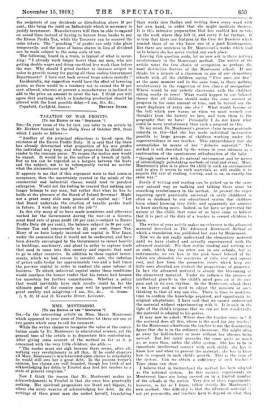TAXATION OF WAR PROFITS.
(To THE EDITOR OP THE " SPECII.TOR."] Sia,—In your issue of the 1st inst. you refer to an article by Mr. Herbert Samuel in the Daily News of October 29th, from which I quote as follows:— "-Another of the principal objections is based upon the existence of the Excess Profits Duty. It is said that the State has already determined what proportion of his war profits the individual may keep, and what proportion he should sur- render to the common purse. To reopen the matter now would be unjust. It would be in the nature of a breach of faith. But no tax can be regarded as a bargain between the State and the subject, not to be subsequently varied no matter what the circumstances may be."
It appears to me that if this argument were to find commsn acceptance, then the uncertainty created in the minds of the commercial and industrial classes would tend to paralyse enterprise. Would not the feeling be created that nothing any longer belongs to any man, but rather that what he has he holds at the pleasure of the Board of Inland Revenue? Might not a great many able men possessed of capital say: " Let that Board undertake the creation of taxable profits itself in future. I wash my hands of the job"?
In this city many of us have made munitions and otherwise worked for the Government during the war—at a Govern- ment fixed rate of gross profit (10 per cent.)—subject to Excess Profits Duty (80 per cent.), the balance subject to 30 per cent. Income Tax and concurrently to 22} per cent. Super Tax. Many of us have largely invested our capital in War Loan, under the assurance that it would not be confiscated, and have been directly encouraged by the Government to invest heavily in buildings, machinery, and plant in order to capture trade that used to come into this country and exports that used to go to other countries. In addition to these capital invest- ments, which we had reason to consider safe, the inflation of prices calls to-day for approximately two and a half times the pre-war capital in order to conduct the same volume of business. To attack industrial capital under these conditions would convince the honest trader that his future had become too uncertain for further commitments. Whether a policy that would inevitably have such results could be for the ultimate good of the country may well be questioned with






































 Previous page
Previous page